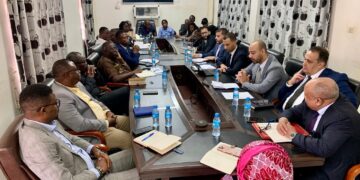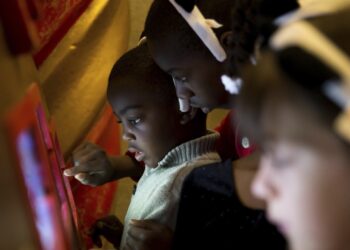
About three years ago, at the height of the COVID-19 pandemic when the whole world was camped online, a particular Nigerian university held its alumni fundraiser. At the fundraiser donations began to pour in from various participants until one doctor based in New York, United States donated a whopping $1 million. After the doctor’s donation the entire exercise came to an abrupt end. Why? The University had exceeded their target, and they were very happy. This single act by one individual is proof of the power that Nigerians in diaspora wield and what they can do to help address the challenges within the educational sector.
Yesterday, I was traumatized by a video which showed primary school pupils in their numbers standing outside a dilapidated school with classroom buildings that appeared as if they had been destroyed by heavy rains somewhere in Edo state. In the footage a gentleman lamented for almost three minutes about the dangerous and parlous state of the school buildings and asked Governor Obaseki of Edo state to intervene. The gentleman also asked the pupils to kneel down and beg the Governor and he also rushed to go and join them in kneeling down whilst making the appeal on his knees. This is sad and unacceptable in the modern era where education ought to be a right and not a privilege.
In South Africa’s largest black township called Southwestern Township (SOWETO) the children of the upper class, middle class and lower class all attend the same primary and secondary schools. The South African government is fundamentally responsible for funding primary and secondary education in the country. The government not only funds schools but also provides educational materials, provides meals: breakfast and lunch which removes enormous pressure from parents or guardians leaving them with no excuse for not sending their children to school. South Africa’s literacy rate is 94.37% (2020) 98.57% primary and 77.52% secondary.
According to President Ramaphosa, access to education for all is the most important instrument we have to end poverty”. President Ramaphosa is a lawyer and is also the second richest black person in South Africa. South Africa’s budget of R298.1 billion ( $15.75 billion) for basic education represents an expenditure of R22, 213 ($1,174) for each of the 13.4 million learners in the public school system and 4.63% of GDP. Nigeria’s entire education budget (N1.79 trillion) for 2023 represents 8.8% of the entire national budget. In essence, what South Africa spends on primary and secondary school education in a year is equal to 50% of Nigeria’s total budget.
The problem of out of school children in Nigeria is an existential crisis of global proportions. 12.4% of the total number of out of school children in Sub-Saharan Africa are Nigerian. According to UNESCO there are 244 million out of school children worldwide out of which there are 20 million out of school children in Nigeria, 10 million in Ethiopia, 5.9 million are in the Democratic Republic of Congo and 1.8 million in Kenya. These vast numbers of out of school children in a country which is Africa’s largest economy is most worrisome and deeply disturbing. It is also deeply concerning because in the North especially, many out of school children end up being recruited by violent non-state actors such as ISWAP and bandits.
I am a Nigerian in the diaspora and sometime in 2020 during COVID-19 I wrote an article titled ‘Africa in the 21st Century and How Nigerians in Diaspora will lead its trajectory for growth’. The article proposes how Nigerians in the diaspora can help to reduce the number of out of school children in Nigeria. Why do I propose the idea that Nigerians in the Diaspora can help reduce the staggering numbers of Nigeria’s out of school children? It is true that many Nigerians in the Diaspora send money to their relatives to directly pay their school fees on a regular basis. In 2018, according to the World Bank, Nigerians in the diaspora remitted $25 billion which amounts to over 83% of the Federal Government budget and 6.1% of GDP. These monies are utilized as social security funds to families (school fees, feeding allowances, hospital bills and so on). Nigerians in the United States specifically contributed $6.1 billion to the total $25billion in remittances in 2012. If we compare the US remittances by Nigerians as a standalone it is more than six times the entire 2023 education budget of Nigeria which stands at NGN1.7 trillion. This means that the total diaspora remittance to Nigeria in 2012 and even in 2018 is twenty-four times the entire education budget of the Federal Republic of Nigeria.
For us to fully appreciate the problem of millions of out of school children in Nigeria we need to dig deeper and look at the numbers. According to Nigerian Publishers Association (NPA) the number of out of school children, ages 6-11 which is primary school age- is a staggering 10,193,918 whereas those from ages 12-14 which is junior secondary school age are 6,192,081. A further breakdown into the six geopolitical zones or constituent parts reveals the following: North Central- 1,329,111, Northeast- 2,001,038, Northwest- 3,490, 671, Southeast- 713,176, South South- 1, 208, 183 and Southwest- 1,451,740. The Southeast with five states out of thirty-six has the least children out of school. The North of the country has the greatest number of out of school children with one Northern geopolitical zone having as much as five times that of the Southeast zone. In my view a figure of almost 3.5 million Nigerian children out of school in the Northwest is also likely a function of the huge populations of states like Kano, Kaduna and Katsina, the three K’s. These three states also produce the highest number of voters in Nigerian elections.
Having established the volume of Nigerian diaspora remittances, the size of the children that are out of school, the size of the entire annual education budget of Nigeria, these following are ways and also examples of how Nigerians in Diaspora can assist to reduce the vast number of out of school children.
First, it is important for Nigerians in the diaspora to convene a diaspora conference to address the specific issue of out of school children and understand what the structures are, the system is, as well as challenges therein. For example, in Nigeria, basic education refers to primary and junior secondary school according to the Universal Basic Education Act. The Child Rights Act 2003 also stipulates nine years of compulsory schooling for children.
There are many issues which plague the education sector such as corruption, lack of furniture and lack of quality teachers. Most of the out of school children are in the Northern part of Nigeria. The Universal Basic Education Commission (UBEC) says that there is a shortage of 907,769 classrooms and a 20,000 schools deficit. There is also a controversy around the exact number of out of school children. If there are 20 million out of school children, a deficit of 20,000 schools and a shortage of 907,000 classrooms, then we must ask ourselves this question. What sort of time frame will be required for the diaspora to assist in reducing these huge figures? Would building infrastructure for schools instantly reduce the classroom deficit and by what amounts? If the diaspora takes a figure of 100,000 classrooms in 10 years how much would it amount to? The diaspora could also look at their current remittances and create a diaspora out of school children fund to assist with teacher training. These initiatives could go a long way in the area of infrastructure and training of personnel.
Nigerians in the diaspora also need to establish a diaspora out of school fund to assist indigent parents or low-income earning parents to facilitate support with procurement of books, tuition fees and school meals, as these costs also affect the ability of parents to send their children to school. This would be helpful because Nigeria’s current education budget represents only 8.8% of the total budget and does not meet the 15%-20% recommended by UNESCO. It means therefore that an amount of at least NGN1 trillion- NGN 1.5 trillion still needs to be found each year and rising with inflation. To invest in classrooms, schools, teacher training and ancillary support directly to parents and pupils would go a long way. There is evidence that some in the diaspora are directly funding education of children in Nigeria. A report was published by Dahlberg on how diaspora funds could be channeled towards investments in SMEs and other activities. The report stated that less attention has been paid however, in investments that diaspora is already making in an area critical to the future of the nation, the education of Nigeria’s children. It says that informally, almost everyone who is sending money or receiving money back will know a child or student whose fees are being paid or who is being helped in other ways with books, uniforms or exams fees, to go to school. In essence, supporting the education of the extended family is a top priority of Nigerians abroad. Research from the digital money transfer service World Remit shows tens of thousands of Nigerian children are in school, have access to books and educational supplies, and are more likely to study and less likely to work due to international remittances. Nigeria is the largest remittance-receiving country in Africa, with annual figures now at a record $25bn.The research reveals the wide-ranging benefits of remittances for children’s education. The findings were calculated using data from UNESCO, the World Bank, and Nigeria’s latest national household survey.
Approximately 220 million children are not in school in low and middle income countries. Of these, over 20 million live in Nigeria, one of the highest numbers of out-of-school children in the world. Key results: approximately 200,000 children in Nigeria are in school as a result of receiving international remittances. Children in Nigeria are 40% less likely to be out of school if their household receives remittances. Remittance-receiving households spend more on education — equivalent to a child’s set of school books for 1.5 years. Children in remittance-receiving households spend less time working on non-school activities, freeing up more time for school studies.
World Remit also calculates that globally, if traditional, cash-based money transfers were replaced by lower-cost digital alternatives, an additional $825 million would be unlocked for families to spend on children’s education. Savings from going digital could pay for the equivalent of 20 million school uniforms, 30 million schoolbooks and 16 million sets of school supplies for children in low- and middle-income countries. The Country Director, Nigeria at World Remit, Pardon Mujakachi, said: As millions of children in Nigeria start a new school year, our research is a timely reminder that the contributions of the diaspora are vital to the education of 200,000 children across the country. Switching to digital remittances would help maximize that even further. World Remit is one of the leading digital money transfer companies for the Nigerian diaspora. Customer surveys reveal that education is one of the top priorities for Nigerians living abroad, with many saying they support the schooling of children back home. These children will therefore have more time to spend on their education and are less likely to be over saddled with household chores, the family business or other forms of work.
The ripple effect gained from an educated population and the role of diaspora remittances holds huge benefits for the world today and in the future. All hands must be on deck to ensure that we can continue reaping the rewards therein. Evidence of diaspora support for education in Nigeria was expressed at a recent fundraiser by the international charity named IA Foundation in London. The fundraiser aimed to address the menace of young children staying out of school in Nigeria. The IA Foundation raised an amount of GBP 24,409.00 approximately 25 Million at their fourth annual black-tie charity ball. According to Mrs. Ibironke Adeagbo, CEO, IA Foundation’ there is a need for Nigerians everywhere in the world to make collaborative social investments in the educational sector to put every Nigerian child in the classroom’. Nigerians in the diaspora should create an education equality fund based on a model whereby each Nigerian success in the diaspora partners with the following local leaders: local government Chairmen, House of Assembly members, Commissioners, Special Advisers, Ministers, Ambassadors, House of Representatives members, Senators and Governors. These leaders, supported by the diaspora, should jointly adopt a student or a school which they fund. This initiative would go a long way in reducing the massive numbers of out of school children in Nigeria. There is a fierce urgency now which needs commensurate action.












































































 EduTimes Africa, a product of Education Times Africa, is a magazine publication that aims to lend its support to close the yawning gap in Africa's educational development.
EduTimes Africa, a product of Education Times Africa, is a magazine publication that aims to lend its support to close the yawning gap in Africa's educational development.